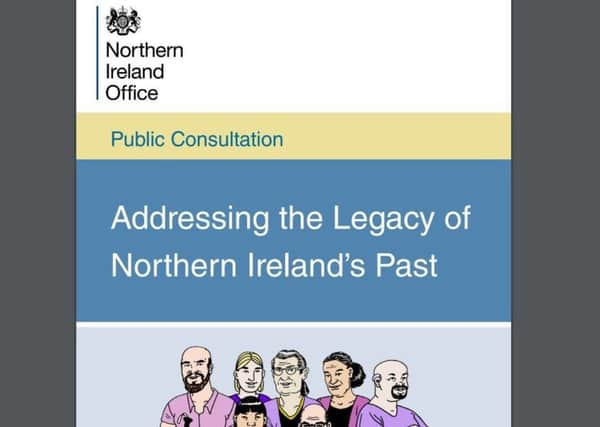Victims of terrorism are facing a trap in legacy proposals, says lawyer


Neil Faris, writing in the News Letter, outlines his fear that victims will think perpetrators will be named when in fact only police officers might be named for misconduct, not terrorists for murder.
Mr Faris, who has studied proposals to deal with the past, has contributed to our Stop The Legacy Scandal series (see link below) on the anti state imbalance in current legacy probes.
Advertisement
Hide AdAdvertisement
Hide AdWe invited contributors to assess whether structures for dealing with the past, agreed in outline at Stormont House in 2014 and now put into draft legislation, will stop the focus on state forces.
Mr Faris thinks it will not, and in fact that the mooted structures will create such an injustice to categories of people including ex RUC officers that the bill would best be scrapped.
“I fear that a trap is being set for victims: they believe that by supporting the proposals they will at least achieve all available ‘truth and justice’,” he writes.
“But in most cases ... terrorists and others who committed crime will be shielded from identification, save in the rare case where a prosecution can be successfully brought to establish guilt beyond reasonable doubt in court. But findings of police misconduct can be made — ‘naming and shaming’ retired RUC officers for alleged ‘misconduct’ [in the Troubles].”
Advertisement
Hide AdAdvertisement
Hide AdMr Faris last year wrote essays in this newspaper questioning whether controversial separate legacy inquests, repeatedly demanded by Sinn Fein, needed to be held to meet UK commitments under Article Two of the European Convention on Human Rights.
A News Letter analysis of the 92 dead to be scrutinised under the legacy inquests will include around 40 people who are terrorist.
The inquests are estimated to cost £1 million each, although some of them will be bunched together.
Even so, these cases will get much more funding per case than the much larger number of outstanding murder cases committed by terrorists, including the victims of some of the most notorious IRA killers, who are among the legacy inquest dead.
Advertisement
Hide AdAdvertisement
Hide AdMr Faris’s essay is the first of his two-part contribution to our series. Tomorrow he says of the police misconduct aspect to the mooted Historical Investigation Unit (HIU) that there “is a well-established principle of disciplinary investigations — that the investigatory power does not stretch into retirement”.
He adds: “But if there were to be a change, it should in fairness apply to society across the board, rather than this target on retired RUC officers alone and in regard to their actions during all the years of the sectarian conflict?”
• The first part of Mr Faris’s two-part essay is here (click on link). The second part will be in Tuesday’s print edition of the News Letter and then put online much later on Tuesday